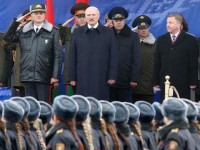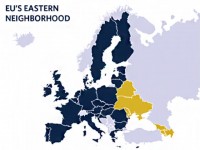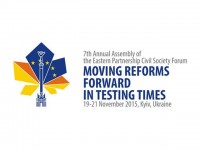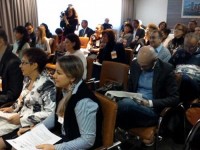Minsk’s muddled media clampdown could jeopardize warming of relations with the West.
Andrei Yahorau: We are trying to show actual situation with international aid to Belarus

Speculations around the issues of providing international donor aid can be stopped only by providing transparency at the highest possible level.
This opinion in the talk with the EuroBelarus Information Service shared Andrei Yahorau, political scientist, the head of the Centre for European Transformation and the co-author of the working paper “Civil society’s role and place in the system of the EU’s donor assistance for Belarus”, which was recently submitted to popular verdict.
— Which changes should civil society try to achieve in the foreign donor aid delivery system?
— First of all, civil society organizations should try to get greater role in such decision-making processes as fund allocation, programs’ subject matters, mechanisms used to provide this aid, etc. — i.e. the whole procedure of decision-making, starting from a plan and finishing with the monitoring of aid programs.
In the situation with Belarus there exists a certain confrontation between the civil society and the state. And civil society should have a possibility to express its consolidated voice when making decisions about where and how international aid should be submitted.
— Is there any chance that the voice of the civil society will be heard, and what arguments can be used for that?
— First of all, such practice corresponds to the common tendency in the development of the international aid at a worldwide level. Civil society is recognized as the key participant in the system of international development and an actor without whom the projects of international aid aimed at development cannot be implemented.
In the second place, if civil society in Belarus is willing to see changes in the country, then the influence on these programs should also be enhanced, as these programs also play important role in the overall development of civil society in Belarus.
— Can it happen so that upon concentrating on the problems of donor aid allocation civil society organizations will turn into some kind of bureaucratic structures, thus causing damage to their main activity?
— Of course, there is a risk that civil society can degrade into service organizations, quasi-bureaucratic and quasi-political structures or the structures which serve exclusively for the international donors.
This risk is especially high in Belarus, also because all the institutions of the civil society are very dependent on the international aid, as they are in fact deprived of internal financing. We all remember that Lukashenka’s regime cut off the possibilities of private business to finance the development of the civil society as far back as 1996. Under these circumstances the dependence on the international donors in great, which results in all sorts of negative tendencies.
— Is there any possibility to avert the development of such tendencies, and what mechanisms exist for that?
— The mechanism is very simple: transparency, openness and ultimate publicity of the activity performed by the civil society organizations. And in this case other organizations and the society on the whole will see and control what is going on in this sphere.
The other thing is that due to the existing legislation the use of international funds in Belarus has to a great extent turned into illegal activity. Thus, we are forced to be not non-transparent in these relations, though we should strive to demonstrate as openly as possible how international aid works. And this research is, basically, one of the steps aimed at demonstration of the actual situation in the sphere of international aid.
We know that there are a lot of speculations in this regard, both from the government and from political opposition, and the two parties criticize the EU for the wrong allocation and distribution of funding. It is because of the closed situation and lack of research why such speculations appear. And that is why we try to show the existing reality and work with the actual state of affairs, not speculations.
Others
-
In Belarus, a rising fear: Will we be the next Ukraine?
The relationship between Russia and Belarus has never been an easy one. The two former Soviet republics have spent the last two decades on a roller coaster ride — sometimes allies, sometimes adversaries in heated public rows.
-
The EU’s Benign Neglect of Eastern Europe
Between November 6 and December 11, 2015, Carnegie Europe continued its Capitals Series. In this second phase, the focus was on the EU’s Eastern neighbors, which the bloc has so often zigzagged over in trying to establish a coherent policy toward them collectively or bilaterally.
-
New ENP and Civil Society’s Role in Focus of the 7th EaP CSF Annual Assembly (Photo)
The 7th Annual Assembly of the Eastern Partnership Civil Society Forum was held in Kyiv on 19-21 November attracting around 300 participants, observers and guests who attended more than 20 sessions and a Networking Fair in the framework of the Assembly.
-
Is social economy a phenomenon for Belarus?
The conference “Social economy: how to be successful despite the crisis” launched in Minsk on October 22.








Comments
From farewell to a new Eastern policy and towards a new development
Poland and Germany were both initiators and drivers of a New Eastern policy linked to the Eastern neighborhood and Russia/Soviet Union.